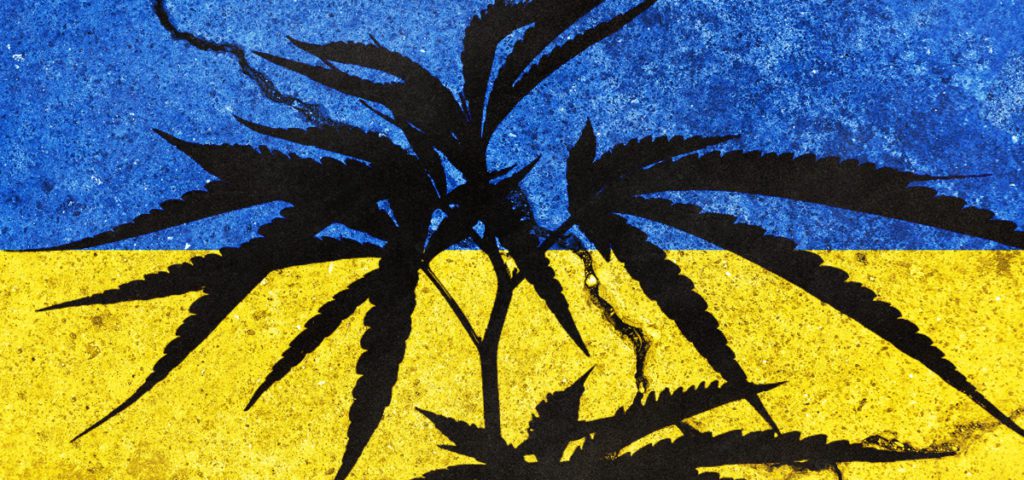Ukrainian lawmakers are reportedly considering steps to legalize medical cannabis access despite an ongoing war against Russia’s invasion.
Why Medical Cannabis Is Gaining a Foothold in War-Torn Ukraine

Full story continued below.
Advertisement
Editor’s note: This op-ed was contributed by Irene Stepanenko, CEO of AskGrowers, a Ukraine-based cannabinoid education platform and online marketplace.
On the morning of February 24, 2022, Russia plunged Ukraine into unimaginable violence. In the months since the first missiles struck civilian homes and public spaces, thousands have lost their lives and millions have been forced to flee to safety.
The war has created a humanitarian crisis not seen in Europe for decades, with no end in sight. An entire generation of Ukrainians will suffer for years to come with physical wounds and psychological trauma on an unprecedented scale.
They will need more than just conventional therapies to cope with the pain and distress. For many, medical cannabis will be the key to managing their post-traumatic stress syndrome and easing the pain of injuries from bombs, missiles, and bullets.
Fortunately, both citizens and politicians are warming to the idea that cannabis should have a place in the clinical toolkit, bringing hope that medical use of these plant-based substances will help Ukraine to rebuild even stronger than before.
Currently, the medical use of cannabis is largely prohibited in Ukraine, except for the use of certain cannabis-based psychoactive substances (nabilone, nabiximol, and dronabinol). Recreational use is completely forbidden, and the production, purchase, storage, transportation, and sale of recreational cannabis is entirely illegal. CBD use is a gray area for the country but is generally limited.
A Parliamentary vote to legalize cannabis-based substances for medicinal use failed in 2021, albeit narrowly. Now, as the war takes its toll on the country, Minister of Health Viktor Liashko has approved a new bill on “cannabis plants for medical, industrial purposes, scientific and scientific-technical activities to create the conditions for expanding the access of patients to the necessary treatment of cancer and post-traumatic stress disorder resulting from the war.”
The draft bill will now head to Ukraine’s parliament, where it must receive at least 226 votes to become law. If this legislation passes, it will allow for a full cycle of cannabis-based drug production in Ukraine, from cultivation and processing to full-fledged production. Liashko believes that keeping the process wholly in the country will give the government more control over the production and sale of the resulting medical products to safeguard patients and prevent unauthorized uses.
The public seems to be in favor of exploring the benefits of medical cannabis, at least for very seriously ill patients. A 2020 survey found that approximately 65 percent of Ukrainians were in favor of legalization – how the war will affect the public perception of cannabis remains to be seen.
Education about cannabis use and its role in medical care will be crucial for increasing this percentage and encouraging acceptance of cannabis products. Providing factual, bias-free information about how cannabis can reduce physical and psychological distress can reduce skepticism, encourage interest, and make eligible patients more likely to take advantage of opportunities for medicinal use.
It’s important to note that in Ukraine, making cannabis available for medical purposes will not make it any more accessible to the average citizen, regardless of our hopes that recreational use will eventually be legalized.
The government is likely to strictly control access to therapies derived from cannabis and prescriptions will only be available to people with a confirmed eligible diagnosis. The use of electronic prescribing will prevent forgeries, while growers will need to obtain special permits to operate. These factors may make it easier for legislation to make it through Parliament, even in the middle of Ukraine’s fight for survival.
For many combat veterans and ordinary citizens suffering from post-traumatic stress disorder and other ailments from the war, speeding up the path to medical cannabis legalization will be essential. The positive benefits of medical cannabis on mental and physical health are not in question, but there is still more work to do before lawmakers and Ukrainian citizens are ready to embrace the potential of cannabis-based treatments.
Even as the war drags on, we are hopeful that Ukraine will be among the fastest countries in Europe to realize that medical cannabis can play a unique and important role in helping survivors reach a peaceful new era that includes the use of natural products as part of the delivery of highly effective healthcare.
Get daily news insights in your inbox. Subscribe
End